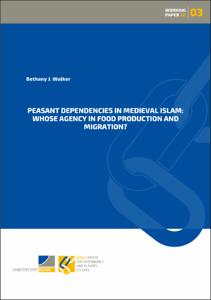Walker, Bethany J.: Peasant Dependencies in Medieval Islam: Whose Agency in Food Production and Migration?. Bonn: Bonn Center for Dependency and Slavery Studies, 2022. In: BCDSS Working Papers, 03.
Online-Ausgabe in bonndoc: https://doi.org/10.48565/bonndoc-63
Online-Ausgabe in bonndoc: https://doi.org/10.48565/bonndoc-63
@techreport{handle:20.500.11811/10446,
doi: https://doi.org/10.48565/bonndoc-63,
author = {{Bethany J. Walker}},
title = {Peasant Dependencies in Medieval Islam: Whose Agency in Food Production and Migration?},
publisher = {Bonn Center for Dependency and Slavery Studies},
year = 2022,
month = mar,
series = {BCDSS Working Papers},
volume = 03,
note = {Medieval feudalism, while it took different forms in different parts of the world, shared one common characteristic: the military, political, and economy foundations of society were constructed with peasant labor. The “state” could not exist, in this form, without a compliant peasantry. The everyday lives of peasantsliving in the pre-industrial world thus evokes images of immobility, servitude, and a legal and social status that remained static over time. The realities of peasant life in the Islamicate world, however, were quite different. This paper explores the marked inequalities of the mutually dependent relationships that developed between the Mamluk and Ottoman sultanates and peasant society, focusing on two areas of encounter and control that mattered most to both sets of actors: food production and peasant mobility in its many forms (relocation, dislocation, abandonment of villages, and mass migration). Land use and human migration provide us with a unique vantage point to study strongly asymmetrical dependencies on the scale of the village and over la longue durée. A joint archaeological-textual study of two villages in Palestine and Transjordan offer us a regionally comparative context.},
url = {https://hdl.handle.net/20.500.11811/10446}
}
doi: https://doi.org/10.48565/bonndoc-63,
author = {{Bethany J. Walker}},
title = {Peasant Dependencies in Medieval Islam: Whose Agency in Food Production and Migration?},
publisher = {Bonn Center for Dependency and Slavery Studies},
year = 2022,
month = mar,
series = {BCDSS Working Papers},
volume = 03,
note = {Medieval feudalism, while it took different forms in different parts of the world, shared one common characteristic: the military, political, and economy foundations of society were constructed with peasant labor. The “state” could not exist, in this form, without a compliant peasantry. The everyday lives of peasantsliving in the pre-industrial world thus evokes images of immobility, servitude, and a legal and social status that remained static over time. The realities of peasant life in the Islamicate world, however, were quite different. This paper explores the marked inequalities of the mutually dependent relationships that developed between the Mamluk and Ottoman sultanates and peasant society, focusing on two areas of encounter and control that mattered most to both sets of actors: food production and peasant mobility in its many forms (relocation, dislocation, abandonment of villages, and mass migration). Land use and human migration provide us with a unique vantage point to study strongly asymmetrical dependencies on the scale of the village and over la longue durée. A joint archaeological-textual study of two villages in Palestine and Transjordan offer us a regionally comparative context.},
url = {https://hdl.handle.net/20.500.11811/10446}
}






